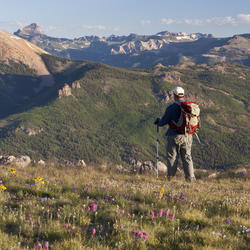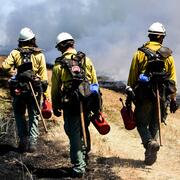James Meldrum (USGS-FORT) presents the results of a study about community preparedness for wildfire conducted with the City of Santa Fe Fire Department in front of a general public audience of Santa Fe, New Mexico, community members, May 2023.
James R Meldrum, PhD
James Meldrum is a Supervisory Research Economist in the Social and Economic Analysis Branch at the Fort Collins Science Center. His primary research focus is measuring, modeling, and understanding human relationships with natural resources.
James' economics and applied social science work spans many areas of interest to the USGS and our federal and non-federal partners. His main research topics include measuring, modeling, and understanding human relationships with natural resources and with natural hazards, especially focused on understanding and mitigating the risks of wildland fire. James is a founding member of the Wildfire Research (WiRē) Team, an interdisciplinary collaboration focused on coproducing science in support of community wildfire adaptedness and wildfire risk mitigation on private lands, and he is an active participant in numerous USGS- and DOI-wide communities of practice.
Research Interests
- Environmental economics
- Wildfire risk mitigation
- Behavioral economics
Professional Experience
Supervisory Research Economist; U.S. Geological Survey, Fort Collins Science Center, Colorado; Nov 2024 to present
Research Economist; U.S. Geological Survey, Fort Collins Science Center, Colorado; June 2016 to present
Research Associate; University of Colorado Boulder, Institute of Behavioral Science (IBS) and Cooperative Institute for Research in Environmental Sciences (CIRES); 2012 to 2016
Policy Analysis Intern; National Renewable Energy Laboratory (NREL), Strategic Energy Analysis Center, Golden, Colorado; 2011 to 2012
Engineering Physicist; Stereotaxis, Inc., Systems Group, St. Louis, Missouri; 2005 to 2006
Education and Certifications
Ph.D. 2012, University of Colorado Boulder Environmental Studies Program, focus on Environmental Economics
M.S. 2010, University of Colorado Boulder Environmental Studies Program, focus on Environmental Economics
B.S. 2005, Washington University in St. Louis School of Engineering and Applied Science, Primary major in Physics with a secondary major in Philosophy-Neuroscience-Psychology
Science and Products
Economics of Wildland Fire
The Wildfire Research (WiRē) Team
Social and economic analysis research in support of public safety, outdoor recreation, and economic growth
Land management research in support of streamlined energy development, economic growth, and wildfire management
Feasibility of Remote Sensing Data Sets for Evaluation of Next Generation Fire Behavior Models
Fish and wildlife science in support of heritage preservation, efficient decision making, wild ungulate management, and outdoor recreation
Fire Behavior and Effects Model Evaluation and Demonstration across Innovation Landscapes.
Demonstrating Improved Risk Assessment Approaches on Department of Defense (DoD) Landscapes
Wildlife Economics
Economics of Outdoor Recreation
Economic Impacts of Public Lands Management
Economic Implications of Sagebrush Treatment and Restoration Practices Across the Great Basin and Wyoming
Evaluations of FSim burn probability maps for pyromes of the conterminous United States based on observed wildfire perimeters Evaluations of FSim burn probability maps for pyromes of the conterminous United States based on observed wildfire perimeters
Household survey data about participation in wildfire risk mitigation cost-share in western Colorado 2013-2017 Household survey data about participation in wildfire risk mitigation cost-share in western Colorado 2013-2017
The Wildfire Hazard and Risk Assessment Inventory (ver. 2.0, September 2024) The Wildfire Hazard and Risk Assessment Inventory (ver. 2.0, September 2024)
Online survey responses from users of the Joint Fire Science Program Fire Science Exchange Network from February 2021 Online survey responses from users of the Joint Fire Science Program Fire Science Exchange Network from February 2021
James Meldrum (USGS-FORT) presents the results of a study about community preparedness for wildfire conducted with the City of Santa Fe Fire Department in front of a general public audience of Santa Fe, New Mexico, community members, May 2023.
Rising rates of wildfire building destruction in the conterminous United States Rising rates of wildfire building destruction in the conterminous United States
Living with wildfire in Estes Valley Fire Protection District, Larimer County, Colorado: 2023 Data report Living with wildfire in Estes Valley Fire Protection District, Larimer County, Colorado: 2023 Data report
Living with wildfire in Montrose County, Colorado: 2023 Data report Living with wildfire in Montrose County, Colorado: 2023 Data report
Living with wildfire in Chelan County Fire District #3, Chelan County, Washington: 2022 data report Living with wildfire in Chelan County Fire District #3, Chelan County, Washington: 2022 data report
Living with wildfire in West Vail, Eagle County, Colorado: 2022 data report Living with wildfire in West Vail, Eagle County, Colorado: 2022 data report
Cascading consequences and interventions for hazards after wildfire in Okanogan County, Washington Cascading consequences and interventions for hazards after wildfire in Okanogan County, Washington
Wildfire risk information sources and the acceptability of fuels treatments near select WUI communities in the Western United States Wildfire risk information sources and the acceptability of fuels treatments near select WUI communities in the Western United States
Are wildfire risk mitigators more prepared to evacuate? Insights from communities in the western United States Are wildfire risk mitigators more prepared to evacuate? Insights from communities in the western United States
Costs of land treatments on public lands in the western United States Costs of land treatments on public lands in the western United States
Evaluating a simulation-based wildfire burn probability map for the conterminous US Evaluating a simulation-based wildfire burn probability map for the conterminous US
Living with wildfire in Lake Wenatchee, Chelan County, Washington: 2022 Data report Living with wildfire in Lake Wenatchee, Chelan County, Washington: 2022 Data report
Living with wildfire in Stemilt Basin, Chelan County, Washington: 2022 Data report Living with wildfire in Stemilt Basin, Chelan County, Washington: 2022 Data report
Non-USGS Publications**
**Disclaimer: The views expressed in Non-USGS publications are those of the author and do not represent the views of the USGS, Department of the Interior, or the U.S. Government.
USGS Wildfire Hazard and Risk Assessment Clearinghouse USGS Wildfire Hazard and Risk Assessment Clearinghouse
Science and Products
Economics of Wildland Fire
The Wildfire Research (WiRē) Team
Social and economic analysis research in support of public safety, outdoor recreation, and economic growth
Land management research in support of streamlined energy development, economic growth, and wildfire management
Feasibility of Remote Sensing Data Sets for Evaluation of Next Generation Fire Behavior Models
Fish and wildlife science in support of heritage preservation, efficient decision making, wild ungulate management, and outdoor recreation
Fire Behavior and Effects Model Evaluation and Demonstration across Innovation Landscapes.
Demonstrating Improved Risk Assessment Approaches on Department of Defense (DoD) Landscapes
Wildlife Economics
Economics of Outdoor Recreation
Economic Impacts of Public Lands Management
Economic Implications of Sagebrush Treatment and Restoration Practices Across the Great Basin and Wyoming
Evaluations of FSim burn probability maps for pyromes of the conterminous United States based on observed wildfire perimeters Evaluations of FSim burn probability maps for pyromes of the conterminous United States based on observed wildfire perimeters
Household survey data about participation in wildfire risk mitigation cost-share in western Colorado 2013-2017 Household survey data about participation in wildfire risk mitigation cost-share in western Colorado 2013-2017
The Wildfire Hazard and Risk Assessment Inventory (ver. 2.0, September 2024) The Wildfire Hazard and Risk Assessment Inventory (ver. 2.0, September 2024)
Online survey responses from users of the Joint Fire Science Program Fire Science Exchange Network from February 2021 Online survey responses from users of the Joint Fire Science Program Fire Science Exchange Network from February 2021
James Meldrum (USGS-FORT) presents the results of a study about community preparedness for wildfire conducted with the City of Santa Fe Fire Department in front of a general public audience of Santa Fe, New Mexico, community members, May 2023.
James Meldrum (USGS-FORT) presents the results of a study about community preparedness for wildfire conducted with the City of Santa Fe Fire Department in front of a general public audience of Santa Fe, New Mexico, community members, May 2023.
Rising rates of wildfire building destruction in the conterminous United States Rising rates of wildfire building destruction in the conterminous United States
Living with wildfire in Estes Valley Fire Protection District, Larimer County, Colorado: 2023 Data report Living with wildfire in Estes Valley Fire Protection District, Larimer County, Colorado: 2023 Data report
Living with wildfire in Montrose County, Colorado: 2023 Data report Living with wildfire in Montrose County, Colorado: 2023 Data report
Living with wildfire in Chelan County Fire District #3, Chelan County, Washington: 2022 data report Living with wildfire in Chelan County Fire District #3, Chelan County, Washington: 2022 data report
Living with wildfire in West Vail, Eagle County, Colorado: 2022 data report Living with wildfire in West Vail, Eagle County, Colorado: 2022 data report
Cascading consequences and interventions for hazards after wildfire in Okanogan County, Washington Cascading consequences and interventions for hazards after wildfire in Okanogan County, Washington
Wildfire risk information sources and the acceptability of fuels treatments near select WUI communities in the Western United States Wildfire risk information sources and the acceptability of fuels treatments near select WUI communities in the Western United States
Are wildfire risk mitigators more prepared to evacuate? Insights from communities in the western United States Are wildfire risk mitigators more prepared to evacuate? Insights from communities in the western United States
Costs of land treatments on public lands in the western United States Costs of land treatments on public lands in the western United States
Evaluating a simulation-based wildfire burn probability map for the conterminous US Evaluating a simulation-based wildfire burn probability map for the conterminous US
Living with wildfire in Lake Wenatchee, Chelan County, Washington: 2022 Data report Living with wildfire in Lake Wenatchee, Chelan County, Washington: 2022 Data report
Living with wildfire in Stemilt Basin, Chelan County, Washington: 2022 Data report Living with wildfire in Stemilt Basin, Chelan County, Washington: 2022 Data report
Non-USGS Publications**
**Disclaimer: The views expressed in Non-USGS publications are those of the author and do not represent the views of the USGS, Department of the Interior, or the U.S. Government.














